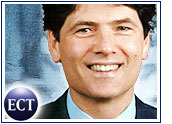
Last week the numbers moved. No, not the election, but something equally important. Let me explain.
For the last couple of years, whenever I ran a survey about CRM acceptance, I always included some questions about how the customer prepared for the deployment. I started doing it because I had a hunch that, as with many earlier ERP deployments, CRM customers were a little cavalier about how they went about implementing CRM. I thought that there would be many who didn’t bother to perform a baseline study of their businesses prior to deploying CRM.
Base-Lining CRM
When I first asked the question two years ago, I was not surprised to see that my hunch was right, though the percentage of companies that said they actually performed baseline studies was disappointing — at the outset there were more companies not doing baseline studies (52 percent) than companies doing them. Nevertheless, more than 70 percent said they were following a CRM plan, which I thought begged the question. How can you have a plan if you don’t know where you started? I had to conclude that by a plan most companies meant a timetable for getting everything to work properly, but that’s a far cry from making everything useful.
Another reason these findings were surprising to me was that there were well known projections that half of all CRM implementations would fail to live up to expectations. It was almost as if there was a fatalistic approach to the deployment or an expectation of divine intervention. In fact, other polling I had done in the insurance industry showed a strong correlation between base-lining and results.
In the insurance study, nearly three-quarters (72 percent) of respondents said they both performed a baseline study and got a positive ROI. Just as important, the converse was also true: About two thirds (66 percent) got a negative return and did little or no advance analysis or planning.
So last week it was a big deal for me to see that in my latest survey data, 62 percent of those surveyed said that they did indeed perform a baseline study before deploying their CRM systems — a significant increase. We are still analyzing the data, and there are other hopeful signs for CRM in it, but I think it would be premature to go into further detail. But stay tuned, there will be more data to come.
Plumbers and Professors
For a long time there have been two unofficial camps in the CRM community. The first camp touted the benefits of implementing CRM as soon as possible because there were inherent benefits in having the databases and making your people use them. I call this group the plumbers because their focus was on building infrastructure — the plumbing.
I refer to the other group as the professors. For a while now, the mantra of the professors has been People, Process and Technology. Perhaps Barton Goldenberg is the dean of the professors; certainly he is a strong advocate of the PPT approach. But CRM Magazine has also been an advocate of this trinity, and at its recent user group meeting in Los Angeles, new Siebel CEO Mike Lawrie was talking the talk as well.
If the two groups follow evolutionary form, I would expect the professors to replace the plumbers in much if not all of their natural range. In fact, I think it’s inevitable. The plumbers have done admirable work developing and deploying CRM’s bag of tricks (the technology) not once but several times — starting with old client-server CRM, consolidating and integrating the suite, and successfully migrating to Web architectures.
But the next iteration of CRM won’t be found in bringing significant new product functionality to market. It will be found in better applying the technology to a host of existing business problems, many of them focused on people and business processes. The professors will be important for setting the agenda in all of these areas based on the business process requirements of the user. That’s a good thing. While there are still too many CRM deployments that show few positive results, not at least we have concrete information about how to avoid many of the pitfalls of a failed or lackluster implementation.
The Next CRM Revolution
As the professors take us deeper into people and process, it’s possible that CRM will undergo yet another transformation. The two signature elements of CRM, people and process, have a lot in common with another area of endeavor: business process optimization and management. It is not unreasonable to think that CRM could split into two parts. One would focuses on people and processes and the services that integrate them (such as training), as well as ongoing assistance for things like analysis and strategy. The other branch of CRM could continue to focus on the technology and infrastructure — perhaps promising a future for the plumbers.
Regardless of how things shake out, the early adopters seem to be poised for a new initiative. The mainstream adopters are now buying CRM in record numbers, which means they will be nipping at the heels of the early adopters soon. The early adopters need something to widen the gap and a focus on people and process is overdue.
Denis Pombriant is former vice president and managing director of Aberdeen Group’s CRM practice and founder and managing principal of Beagle Research Group. In 2003, CRM Magazine named Pombriant one of the most influential executives in the CRM industry.























































